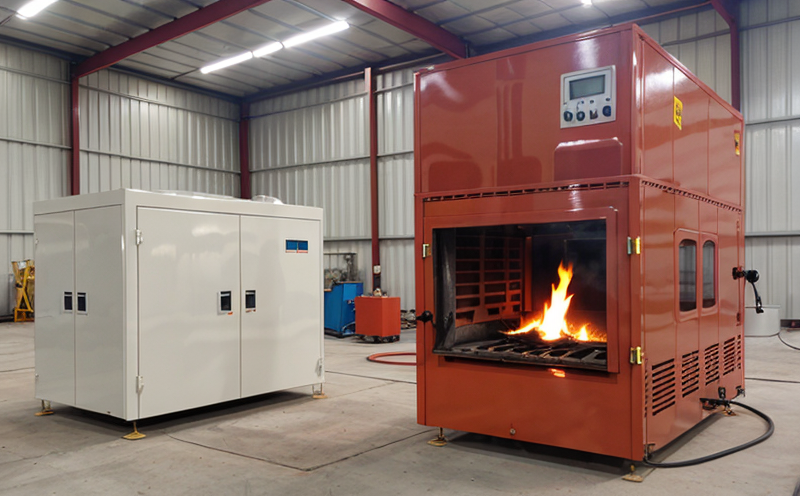ISO 11359-2 TMA Thermal Expansion Testing
The ISO 11359 series of standards provides a comprehensive approach to determining the thermal expansion behavior of materials using Temperature Modulated Analysis (TMA). This method is particularly useful for understanding how materials respond to temperature changes, which is crucial in industries where thermal stability and dimensional accuracy are paramount.
The TMA testing process involves measuring the linear expansion or contraction of a sample as it is subjected to varying temperatures. The technique is non-destructive, allowing for repeated measurements on the same specimen if necessary. This makes ISO 11359-2 a valuable tool in quality assurance and research & development.
The testing apparatus typically consists of a furnace that heats or cools the sample at controlled rates while it is mounted between two precision measuring points. These points measure any changes in length due to thermal expansion or contraction with high accuracy. The temperature modulation allows for more precise determination of the material’s response under various conditions.
The process begins by selecting an appropriate specimen that represents the material being tested. Specimen preparation is critical; it involves ensuring uniformity in shape and size, which can significantly affect results. Once prepared, the sample is placed into the TMA instrument where heating or cooling occurs gradually over a specified range.
The test parameters are defined by the standard itself but may include starting temperature, end temperature, rate of temperature change, and the type of furnace used (e.g., inert gas, vacuum). These conditions ensure that all measurements are comparable and repeatable. The data collected from these tests can then be analyzed to determine the coefficient of thermal expansion at different points within the specified range.
The results of ISO 11359-2 TMA testing provide valuable insights into how materials behave under varying temperatures, which is essential for applications ranging from aerospace components to electronic devices. Understanding these behaviors helps manufacturers design products that can withstand extreme environmental conditions without degrading in performance or integrity.
For instance, aerospace engineers use this information to ensure their parts remain stable at high altitudes where temperature fluctuations are common. Similarly, electronics firms rely on TMA data when selecting materials for circuits and enclosures exposed to heat generated during operation.
The accuracy and reliability of ISO 11359-2 testing make it a cornerstone in industries requiring precise knowledge about thermal properties. By adhering strictly to the international standards outlined in this standard, laboratories can produce consistent results that are trusted both domestically and internationally.
Understanding the nuances of ISO 11359-2 also aids in identifying potential issues early on during product development cycles, thereby saving time and resources later. This proactive approach ensures compliance with industry regulations while enhancing product quality.
In summary, ISO 11359-2 TMA thermal expansion testing offers a robust framework for evaluating material behavior across temperature extremes. Its applicability spans numerous sectors including aerospace, electronics manufacturing, automotive design, and more.
Applied Standards
- ISO 11359-2: This standard specifies the procedure for determining the linear expansion of materials by temperature modulation analysis. It covers the equipment, sample preparation, measurement methods, and reporting requirements.
Industry Applications
The application of ISO 11359-2 TMA thermal expansion testing extends across multiple sectors. Here are some key areas:
- Aerospace: Ensures parts remain dimensionally stable at high altitudes.
- Electronics Manufacturing: Selects materials suitable for circuits and enclosures exposed to heat.
- Automotive Design: Evaluates materials used in components subject to temperature variations during operation.
Quality and Reliability Assurance
ISO 11359-2 TMA thermal expansion testing plays a crucial role in maintaining quality standards across various industries. By providing precise data on how materials behave under temperature changes, this method helps prevent failures due to thermal mismatch or stress.
In aerospace applications, for example, where parts must operate reliably over wide temperature ranges, accurate knowledge of their thermal expansion characteristics is vital. Similarly, in electronics manufacturing, selecting the right materials ensures durability and reliability even when subjected to high temperatures during operation.
The consistent results provided by ISO 11359-2 testing enhance trustworthiness among stakeholders within and outside an organization. This consistency aids in meeting regulatory requirements and international standards, ensuring that products meet or exceed expected performance levels.
Moreover, the ability to identify potential problems early through this testing process allows for corrective measures before full-scale production begins. Such proactive approaches contribute significantly towards maintaining high-quality outputs consistently across all manufacturing processes.





